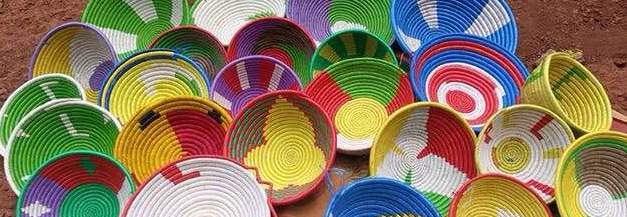Since the 1970s, our global population has been undergoing a (gradual) green revolution. People today understand that a modern lifestyle needs to either preserve or replenish the earth’s precious natural resources. The very same resources (air, water, sub-surface minerals) that only became threatened with the drive toward infinite economic growth and unchecked consumption.
Things I did as a “green” Canadian, back in the day, include making my own cleaning products, religiously switching off lights, unplugging my small appliances when not in use, and installing a programmable thermostat.
Meanwhile, Ugandans had been living their lives.
RELATED: view our viral Tiktok about climate action in Uganda
Traditional and modern life in Uganda has been green all along.
The Real Uganda offers 2 – 12 week locally-led communty-based volunteer programs.
11 ways life in Uganda is naturally (culturally?) green:
1. Most of the food we eat is grown at home, or within a few kilometres of where we consume it. We don’t eat meat everyday. We eat almost no processed food. We eat fresh, requiring little refrigeration. All food scraps are thrown directly into the garden, or given to the local neighbourhood livestock farmer for feed.
2. Ice in our drinks? What’s that? Ugandans even request warm beer!
3. Everything, and I mean everything, is fixed, re-used or handed down. Shoes are re-soled and stitched, trousers and sauce pans are patched, mobile phones are passed around, jerrycans are re-purposed:

Almost nothing ends up in a landfill.
RELATED: 21 books about African life, culture, history, and travel
4. We hand-make many basic household items: bricks, baskets, mats, brooms, toys. We steam our food in banana leaves. Grass thatched roofing has a certain panache. No need for imports made by machine on other continents (colourful washbasins, notwithstanding).
5. Speaking of washing, it’s all done by hand, in cold water, and hung out in the sun to dry.
6. Speaking of clothing, our markets do a bustling trade in high-quality second hand items for the whole family!
7. Our sun shines 12 hours a day, pretty much year round. You won’t see any Ugandan using electric lights until after dark. Life goes on as the room slowly gets darker and darker and darker…
8. A sizeable majority of Ugandans don’t have indoor running water. Water is fiercely conserved. Bathing and dishes are done in shallow basins with only a few litres of water.
9. All that food we grow in our gardens? It’s rain watered. Many homes harvest rain water from their roof-tops (myself, included). Uganda’s vast network of urban and rural unpaved roads allows rain water to be largely absorbed in place, rather than lost to run-off.

Funny Story:
I have a friend who washes his eggs before boiling them. He boils them in the same water he uses for his tea! Cheap? Yes. Green? Most definitely!
RELATED: Want to volunteer in Africa? Read these independent reviews of The Real Uganda
10. Ugandans walk, bike, carpool and use public transport. One of my favourite pastimes is counting how many school kids can squeeze onto a bodaboda (motorcycle) at one time. You almost never see a lone Ugandan in a car. Taxis are famously over-loaded.
11. We are going solar. As Uganda rapidly develops, many upcountry homes and national park lodges are being built with solar lighting and water heaters. The technologies are finally becoming affordable enough for us to bypass the electrical grid altogether!
No time to volunteer? The Real Uganda supports ongoing community-based programs.
Many of you reading this have been to or are living in Uganda. What can you add to this list? Comments are open below.
Having said all this, I’m not gonna lie to you. Uganda is falling into a few unsustainable economic development traps. We burn our plastic rubbish which makes our switch from glass to plastic soda bottles especially worrying. Our emerging middle-class has a weakness for huge, gas guzzling, air conditioned private vehicles. What of our growing dependence on charcoal for cooking?
The next 20 years will be interesting as Uganda grows it’s middle class, attracts outside investment, and begins to shift from rural to urban living. Let me hope quasi-ethical corporate marketing, promoting “must-have” luxury items to the nouveau riche, doesn’t result in Ugandans forgetting their green roots!




![5 Easy & Affordable Weekend Trips from Kampala Uganda [UPDATED] Traveling near Kampala is easy and cheap. There's adventure, relaxation, and loads of wildlife!](http://volunteertherealuganda.com/wp-content/uploads/2017/01/Sipi-Falls-August-2010-032-Copy.jpg)






Trackbacks/Pingbacks